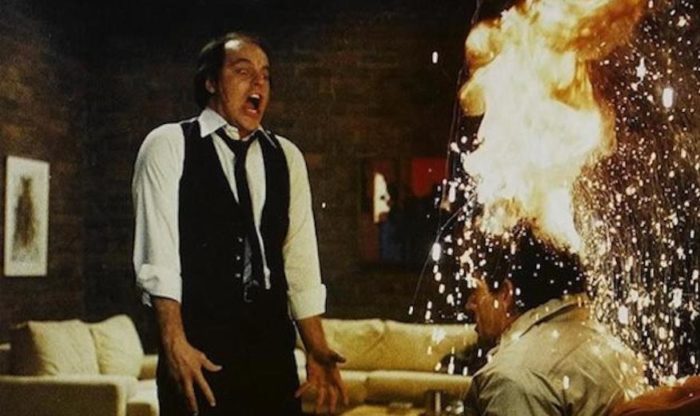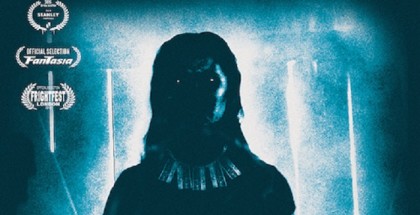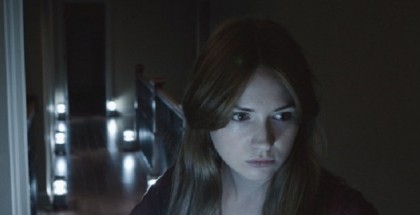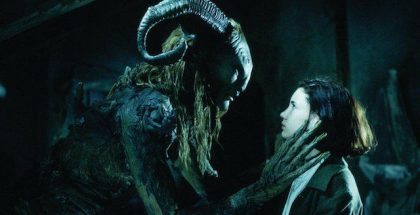VOD film review: Scanners (1981)
Review Overview
Patrick MacGoohan
9The sense of not all being there
5Cinema's most iconic exploding head
10Anton Bitel | On 14, Sep 2018
Director: David Cronenberg
Cast: Stephen Lack, Jennifer O’Neill, Patrick McGoohan, Michael Ironside, Lawrence Dane, Robert Silverman
Certificate: 18
There is something cold and clinical about David Cronenberg’s Scanners. It is not just the film’s Montreal and Toronto locations – a mall, lecture rooms, corporate buildings, laboratories and a doctor’s office – but also the dead-eyed performance of Stephen Lack, whose protagonist Cameron Vale is disoriented and disengaged from the world. We first see him stumbling in through a door marked “Emergency exit only” – a topsy-turvy entrance that instantly reveals him as a social misfit, out of kilter with his environment. This impression is confirmed as Cameron staggers about the brightly lit shopping centre, scratching himself and stealing food from tables. “It’s awful – I don’t know how they let creatures like that in here,” comments a woman, her whispered voice clearly audible in Cameron’s head, despite the physical distance between them. As Cameron stares weirdly at her, the woman’s nose starts to bleed and she has a seizure – and two men appear and shoot a tranquiliser dart into Cameron’s wrist before he is able to get away.
“You’re 35-years-old, Mr Vale,” states the bearded, fatherly Dr Paul Ruth to his bound patient. “Why are you such a derelict, such a piece of human junk? The answer’s simple: you’re a scanner.” Ruth is played by Patrick McGoohan, star of television’s The Prisoner (1967-68), hinting at the conspiratorial power play to come – but his reversed rôle here as captor suggests that his one-time struggles for independence and escape have now been passed down to the next generation. Scanners, it turns out, are people born with an abnormality that sets them apart. The downside of this condition is a constant, crippling cacophony of voices in the head, which makes it impossible for them to integrate or adjust to normal life. The upside, though, is an extraordinary telepathic power, enabling them to enter and take control of other people’s (and even computer network’s) central nervous systems, so that they can read their thoughts, manipulate them like marionettes, or even – as is graphically demonstrated in an early scene, courtesy of Dick Smith’s spectacular SFX – cause their heads to explode.
Paul is a psychopharmacologist whose interest in scanners is both professional and personal – but ConSec, the international security organisation for which he works, hopes to harness and weaponise them. Lately, however, the scanners have got out of control. The most powerful of them, Darryl Revok (Michael Ironside), is on the run, recruiting scanners for his own private army and killing any who refuse to sign up. Paul’s hope is to use new kid on the block Cameron to find and infiltrate Darryl’s group – but when he discovers Kim Obrist (Jennifer O’Neill) and her more peaceful underground community of scanners, and learns about his own origins and connections with Paul and Darryl, Cameron becomes increasingly conflicted in his allegiances and identity.
Scanners is a film of shocking, (r)evolutionary events, told in an aloof, depersonalised manner that never feels anything less than alienating (replicating the experiences of Cameron and co.). It is also, if you abstract away from all the psionic activities and freak-staring face-offs, a prescient allegory for today’s debate about the place of autism and schizophrenia (scanners display symptoms of both) in a neuro-normative world that demonises or demeans any kind of otherness. Born of a thalidomide-like medical mistake (or was it more than a mistake?) and condemned by their condition to a life on the edge of society, the scanners have come to embody marginalisation. One, played by Robert Silverman, has even sublimated his mutant urges into grotesque outsider art – forging an oblique sympathetic link between independent filmmaker of the grotesque Cronenberg and his SF subjects. Yet as their different groupings seek to create a community safe from the rest of us, or militantly resist and dominate the species that they have outpaced, Cronenberg is dramatising the same discourse that would run through the X-Men films, while bringing to his plotting’s careful thesis and antithesis a final, paradoxical synthesis that doesn’t so much resolve the film’s factionalised divisions as collapse them into a single, confused hybrid. The final words of Scanners – “We’ve won” – may bring with them something of the triumphalism typically associated with a Hollywood ending, but by this point, it is unclear who exactly ‘we’ is, and who, in this victory, has lost.




















